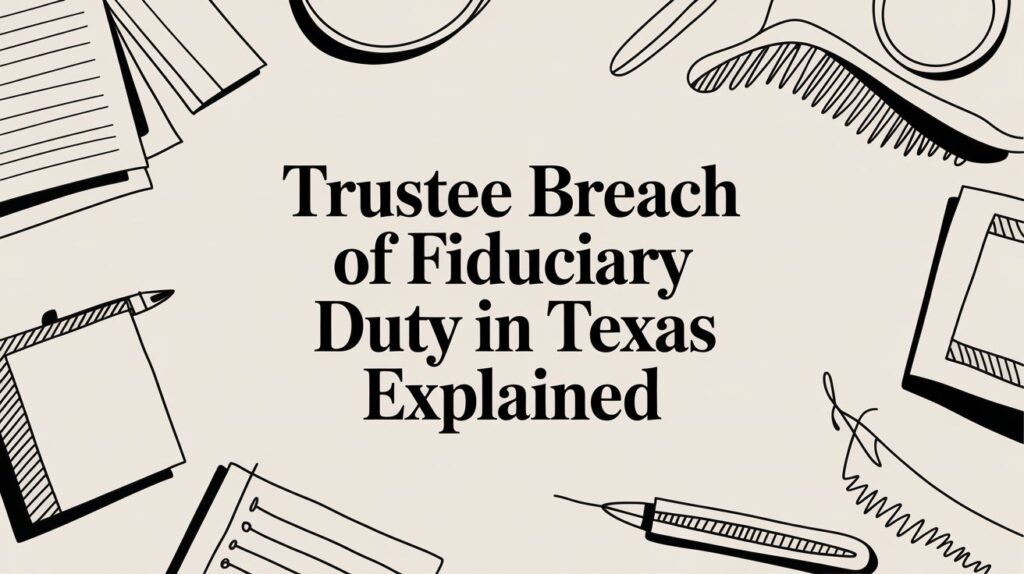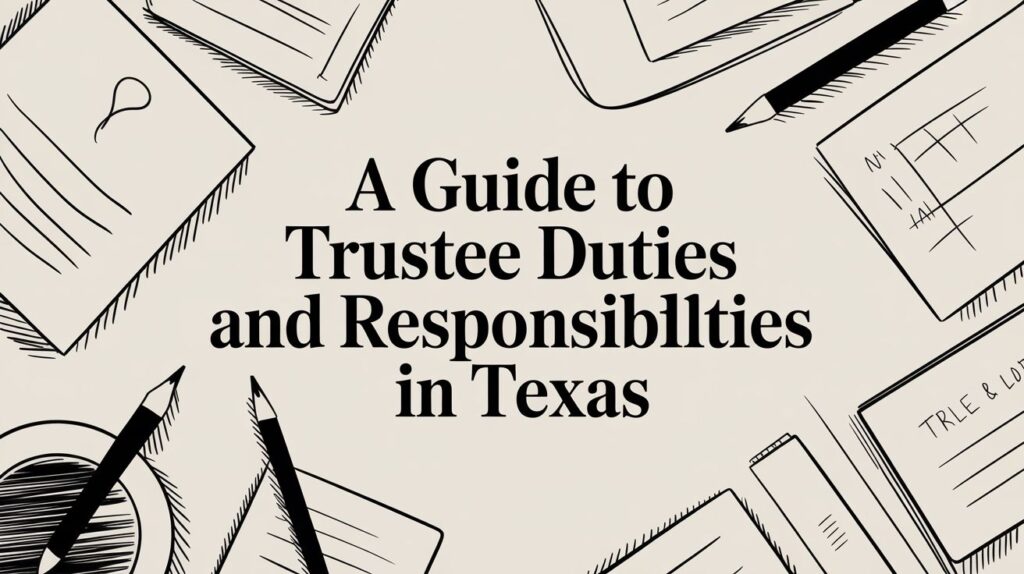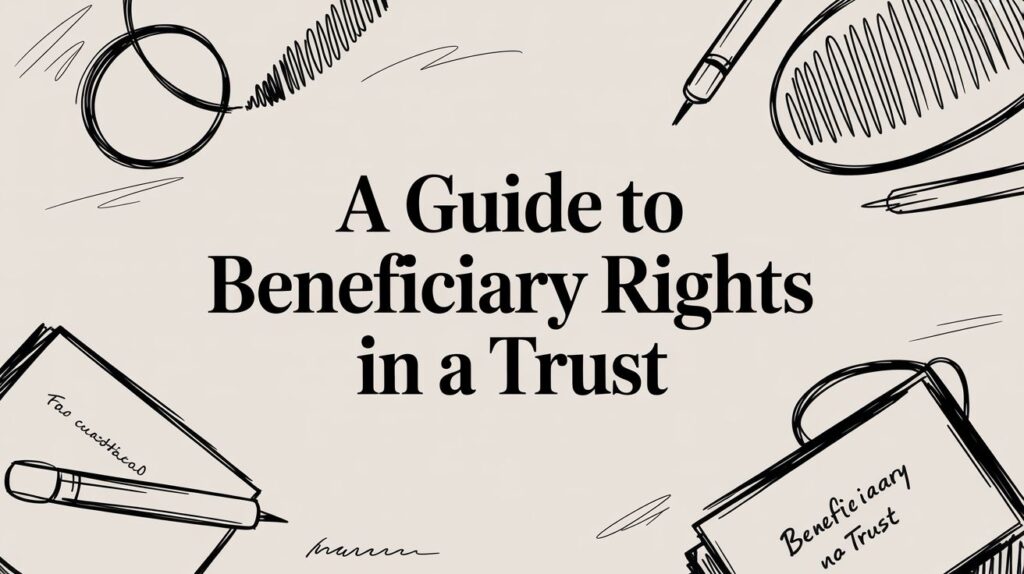Managing a loved one’s trust can feel overwhelming, especially when you suspect something isn't right. When the person in charge fails to act in the best interests of the beneficiaries, it’s known as a trustee breach of fiduciary duty. This guide explains your rights under Texas law and provides clear, step-by-step guidance to help you protect your family’s legacy with confidence and peace of mind.
Your Rights When a Trustee Mismanages a Trust
When a family member places their legacy in someone's hands, it's an enormous responsibility. As a beneficiary, you are placing just as much faith in that trustee to honor your loved one's intentions. Suspecting that this trust has been broken can be emotionally and financially devastating.
At The Law Office of Bryan Fagan, PLLC, we believe understanding your rights is the first step toward peace of mind. The Texas Trust Code provides specific, legally enforceable rights to demand transparency and hold trustees accountable for their actions.
Understanding Your Core Protections
Texas law provides a solid framework to protect your interests. These are not mere suggestions—they are legal obligations a trustee must follow. Your most fundamental rights include:
- The Right to Information: You are entitled to receive clear information about the trust's assets, debts, and all its activities. A trustee cannot operate in secret.
- The Right to an Accounting: Beneficiaries have the power to demand a detailed financial report, known as an accounting. This report must clearly lay out every transaction, including all income, expenses, and distributions made from the trust.
- The Right to Loyal Administration: The trustee is required to act only in your best interest. This means no conflicts of interest or self-serving deals are permitted.
This infographic breaks down the three main pillars of your rights as a beneficiary in Texas.
As you can see, your ability to demand financial records, get key information, and even petition a court to remove a trustee are fundamental protections under Texas law. If you feel you are being kept in the dark or suspect something is wrong, exercising these rights is your critical first step.
You can dive deeper into the specifics by reading our full guide on beneficiary rights in Texas trust administration. Our goal is to give you the clarity you need to secure your family’s legacy.
Understanding a Trustee’s Core Fiduciary Duties

Think of a trustee as the guardian of a trust's assets and, more importantly, its purpose. Under the Texas Trust Code, this isn't just a job title; it's a profound legal and ethical commitment known as a fiduciary duty. This is the highest standard of care recognized by law, and it boils down to one simple, powerful rule: the trustee must always act in the best interests of the beneficiaries.
These duties are not suggestions—they are strict, non-negotiable rules. A trustee must set aside their personal interests and emotions to follow the trust's instructions and the law with absolute fidelity. When they fail to meet this high standard, it's called a trustee breach of fiduciary duty.
To fully grasp a trustee's role, it’s helpful to understand the broader legal context of what constitutes a breach of fiduciary duty. This knowledge empowers beneficiaries to recognize when a trustee's actions have crossed a serious legal line.
Let's break down the core duties a trustee in Texas must uphold in plain English.
The Duty Of Loyalty
The absolute bedrock of a trustee's responsibility is the Duty of Loyalty. This means the trustee must administer the trust solely for the benefit of the beneficiaries. There is zero room for self-dealing, personal gain, or conflicts of interest.
For example, a real-world scenario could involve a trustee selling a trust property to themselves at a discounted price or investing trust funds into their own struggling business. Their loyalty must be completely undivided.
The Duty Of Prudence
Next is the Duty of Prudence. This requires the trustee to manage the trust's assets as a reasonably cautious and sensible person would manage their own affairs. This doesn't mean they need to be a Wall Street wizard, but they must exercise reasonable care, skill, and caution.
This duty often involves creating a sound investment plan, diversifying assets to manage risk, and avoiding overly speculative ventures. A trustee who lets a valuable trust property fall into disrepair or gambles the trust's money on a risky startup has likely breached this duty.
A trustee’s role is to preserve and grow the trust assets for the beneficiaries, not to gamble with them. The law holds them to a standard of careful, responsible stewardship.
To give you a clearer picture, here’s a quick rundown of a trustee’s primary obligations.
Core Fiduciary Duties of a Texas Trustee at a Glance
| Fiduciary Duty | What It Means in Plain English | Example of a Breach |
|---|---|---|
| Duty of Loyalty | The trustee must act only in the beneficiaries' best interests, with no self-dealing. | Using trust funds to give a loan to their own company. |
| Duty of Prudence | The trustee must manage trust assets carefully and sensibly, avoiding excessive risk. | Investing the entire trust in a single, volatile cryptocurrency. |
| Duty to Administer Trust | The trustee must follow the instructions written in the trust document to the letter. | Ignoring a term in the trust that requires distributing funds for a beneficiary's education. |
| Duty of Impartiality | The trustee cannot play favorites among multiple beneficiaries. | Consistently giving larger discretionary payments to one child over another without justification. |
| Duty to Account | The trustee must keep detailed, accurate records and be transparent with beneficiaries. | Refusing to provide beneficiaries with a statement of the trust's income and expenses. |
| Duty to Protect Property | The trustee must take control of and safeguard all trust assets. | Failing to purchase insurance for a valuable piece of real estate owned by the trust. |
These duties form the legal guardrails that keep a trust on track and protect the people it was designed to help.
Other Critical Fiduciary Duties In Texas
Beyond these core principles, several other duties are central to fiduciary duties in Texas. A trustee must manage all of them to stay on the right side of the law.
- Duty to Administer the Trust: The trustee must follow the specific terms and instructions laid out in the trust document without exception.
- Duty of Impartiality: If there is more than one beneficiary, the trustee cannot pick favorites and must treat everyone fairly.
- Duty to Account: Trustees must keep meticulous records of every transaction and provide a formal accounting to beneficiaries upon request. Hiding information is a major red flag.
- Duty to Control and Protect Trust Property: The trustee is responsible for taking legal control of all trust assets, ensuring they are properly insured, and defending them from any outside claims.
Understanding these core responsibilities is the first step for any beneficiary worried about misconduct. If you believe a trustee is failing in any of these areas, it may be time to seek guidance from a Texas trust administration lawyer.
Recognizing Common Red Flags of a Breach

Understanding the legal theory behind fiduciary duties is one thing, but knowing what a trustee breach of fiduciary duty looks like in the real world is what empowers you to act.
These breaches often start with subtle actions a beneficiary might easily overlook. Catching these warning signs early is crucial for protecting the trust's assets and ensuring your loved one's final wishes are honored. It’s about spotting patterns that don’t feel right and fail to meet the high standard of care required by the Texas Trust Code.
Financial and Communication Issues
One of the loudest alarm bells is a lack of transparency. If a trustee becomes secretive or defensive about the trust’s finances, they may have something to hide. An honest fiduciary welcomes questions and provides clear, detailed answers.
Keep a sharp eye out for these specific warning signs:
- Delayed or Missing Accountings: A trustee who fails to provide a regular, detailed accounting is violating a core duty. This is often the first sign that something is wrong.
- Unusual or Unexplained Transactions: Large, frequent, or vaguely described withdrawals should prompt immediate questions. Payments to the trustee’s own family or businesses are also massive red flags.
- Poor Communication: When a trustee ignores your calls and emails or gives evasive answers to direct questions, it points to either negligence or an active effort to conceal information.
In Texas, a beneficiary has a legal right to demand a formal accounting. A trustee's refusal isn't just poor communication; it's a direct violation of their duties and a huge warning sign that needs immediate attention.
Self-Dealing and Conflicts of Interest
The duty of loyalty is absolute—the trustee must act only for the beneficiaries. Self-dealing occurs when a trustee uses their position to enrich themselves. This is one of the most serious breaches.
Here’s a real-world scenario: imagine a trustee is also a real estate agent. They sell a valuable property owned by the trust and collect a commission on the sale. Even if the price was fair, the trustee has created a conflict of interest by personally profiting from their role, which is a breach of their duty.
Another classic example is when a trustee sells a trust asset—like a family home or a classic car—to themselves or a close relative for far less than its actual worth. This directly depletes the trust's value for the trustee's personal gain. If you spot any deals that seem to benefit the trustee more than the trust, it's a clear signal to have an experienced Texas estate planning attorney review the situation. These actions go against the very heart of fiduciary duties in Texas and can cause devastating financial damage.
Juggling Modern Investment Duties and ESG Factors
In today's complex financial world, a trustee's duty to invest trust assets has become more challenging, especially with the rise of Environmental, Social, and Governance (ESG) investing. While many people feel a strong pull towards these causes, a trustee's fundamental duty under the Texas Trust Code is clear: they must always act in the best financial interest of the beneficiaries.
This creates a delicate balance. A trustee's personal ethics or passion for a social cause cannot legally take priority over the duty to secure solid financial returns for the trust. If a trustee prioritizes a cause over sound financial management, they could be held liable for a trustee breach of fiduciary duty.
The Prudent Investor Rule Is Still King in Texas
The guiding principle for any trustee's investment strategy is the Prudent Investor Rule. This rule demands that the trustee manage trust funds with the same care, skill, and caution that a reasonably sensible person would use in a similar situation.
The rule focuses on building a diversified portfolio, managing risk, and achieving overall performance. While ESG factors can be part of a smart risk assessment—for instance, considering how new environmental laws might impact a company's profitability—they cannot be the main reason for an investment choice if it means sacrificing financial results. A trustee must be able to defend every investment decision with a solid financial argument aimed at benefiting the beneficiaries.
The legal standard in Texas is unwavering: the trustee's loyalty is to the financial well-being of the beneficiaries. A trustee who invests trust funds based on personal beliefs, leading to lower returns, is putting themselves at significant risk of being held liable for the losses.
When ESG Crosses the Line into a Potential Breach
So, when does a well-intentioned choice become a breach of duty? It happens when an investment strategy appears to be guided more by a trustee's personal values than their obligation to maximize returns for the beneficiaries.
For example, if a trustee invests heavily in a "green" fund that is consistently underperforming while ignoring a more stable, higher-yield traditional fund, the beneficiaries could make a strong case that the trustee failed in their duty of prudence. To navigate these complex financial waters, trustees should familiarize themselves with essential portfolio management best practices.
This isn't just a hypothetical problem. A major University of Chicago study examined this issue and found that high-sustainability funds did not outperform their lower-rated peers. This reinforces the core legal principle: a trustee's primary job is to protect the financial health of the trust. You can learn more about these fiduciary challenges by reviewing the study's findings.
For beneficiaries, if you notice the trust's portfolio is heavily tilted toward specific social causes while performance is lagging, it is reasonable to ask for a detailed explanation. If the trustee cannot provide a compelling financial reason for their choices, it may be time to consult a Texas trust administration lawyer.
Your Step-by-Step Plan If You Suspect a Breach

Suspecting a trustee is violating their duties can be incredibly stressful, but a calm, methodical approach is your strongest asset. Acting on emotion can complicate matters. Instead, a strategic plan based on your rights under the Texas Trust Code will lead to the best possible outcome.
This practical action plan will guide you through the critical first steps if you are concerned about a potential trustee breach of fiduciary duty. The goal is to gather facts, understand the situation clearly, and prepare to protect your interests effectively.
Step 1: Document Everything
Before taking any other action, start a detailed record of every interaction and observation. Do not rely on memory. Meticulous documentation is the foundation of any potential legal claim and provides your attorney with the hard evidence they need.
Your records should include:
- Communications: Save every email, letter, and text message between you and the trustee. For phone calls, keep a log with the date, time, and a summary of the conversation.
- Financial Records: Organize all statements, accountings, and other financial reports you have received from the trust.
- Specific Concerns: Write down every action (or inaction) that worries you. Note dates and any relevant details. For example, if the trustee allowed insurance to lapse on a trust property or made a questionable investment, document when you discovered it.
Step 2: Formally Request an Accounting
Under Texas law, you have a legal right as a beneficiary to demand a formal trust accounting. This is more than a simple bank statement; it is a detailed, comprehensive report showing all income, expenses, distributions, and transactions within the trust.
Putting this request in writing is crucial. It creates an official paper trail and starts a legal clock. If a trustee refuses or fails to provide a complete and accurate accounting after a formal request, it is a major red flag and a direct violation of their fiduciary duties in Texas.
A written request for an accounting is often the first official step in resolving these disputes. It sends a clear signal to the trustee that you are serious about transparency and know your rights.
Step 3: Consult with a Texas Trust Litigation Attorney
Before sending a demand letter or taking other significant action, it is essential to get professional legal advice. An experienced Texas trust administration lawyer can review your documentation, analyze the trust agreement, and determine whether a breach has occurred.
They will explain your options, which could range from negotiating a resolution to filing a lawsuit to remove the trustee or recover damages. This expert guidance ensures your next steps are strategic and protect your rights without escalating the situation unnecessarily.
Understanding the nuances of trust administration strategies in Texas is vital, and a skilled attorney provides the clarity you need to move forward with confidence.
Legal Remedies for Beneficiaries in Texas
Discovering a trustee has breached their fiduciary duty can be a painful experience of betrayal and uncertainty. However, when a court confirms that a trustee breach of fiduciary duty has occurred, Texas law provides powerful legal tools to make things right.
These remedies are designed to fix the problem, restore the trust to its rightful state, and protect beneficiaries from further harm. A judge has broad authority to take decisive action and ensure the trust creator's intentions are honored.
Holding a Trustee Accountable
When a beneficiary takes legal action, a Texas court has several options to correct the trustee's misconduct. The primary goals are to remove the source of the problem and repair any damage done.
Common remedies a court can order include:
- Trustee Removal: This is often the most critical step. If a trustee has proven to be negligent, dishonest, or untrustworthy, the court can order their immediate removal and appoint a successor trustee.
- Surcharging the Trustee: This remedy makes the trustee pay for their mistakes. A surcharge holds the trustee personally liable for any financial losses their actions caused. They must repay the trust from their own pocket for lost investment value, stolen funds, or unreasonable expenses.
- Compelling Action: Sometimes the issue is what a trustee failed to do. In these cases, the court can force the trustee to perform their duties, such as making a required distribution or providing a long-overdue accounting report.
- Asset Recovery: If a trustee improperly sold or transferred a trust asset, the court has the power to void the transaction and order the property to be returned to the trust.
These legal actions are the backbone of dispute resolution and litigation in Texas trusts. Knowing these remedies exist gives beneficiaries the confidence to stand up for their rights and protect their inheritance.
Common Questions About Trustee Duties
When you're dealing with a trust, many questions can arise. It's completely normal. Let's walk through some of the most common concerns beneficiaries have about a trustee's responsibilities and what happens when things go wrong.
How Long Do I Have to Sue a Trustee in Texas?
In Texas, you generally have four years to bring a claim for a breach of fiduciary duty. However, the "discovery rule" often applies, meaning the clock may not start ticking until you discover the breach, or reasonably should have discovered it.
Because these deadlines can be complex, it is critical to speak with a Texas trust administration lawyer as soon as you suspect something is wrong. Waiting could jeopardize your right to take action.
Can a Trustee Be Held Personally Liable for Losses?
Yes, absolutely. If a court finds a trustee has breached their duty and caused financial harm to the trust, they can be ordered to repay those losses from their own personal funds.
This powerful legal tool, known as a "surcharge," is one of the most direct ways to hold a trustee accountable and make the trust whole again. It ensures that the trustee, not the beneficiaries, bears the financial consequences of their misconduct.
What Is the Difference Between a Trustee and an Executor?
While both are fiduciaries who must act in others' best interests, their roles are different. Think of it this way:
- A trustee is a long-term manager. They manage assets within a trust for beneficiaries, a role that can last for many years or even decades. The trust is part of a comprehensive estate planning strategy.
- An executor is a short-term project manager appointed by a probate court to settle a deceased person's estate. Their job is to gather assets, pay debts, and distribute the remainder to heirs. Once the estate is settled, their role is typically over.
If you’re managing a trust or planning your estate, contact The Law Office of Bryan Fagan, PLLC for a free consultation. Our attorneys provide trusted, Texas-based guidance for every step of the process.
Find out more at https://texastrustadministration.com.







